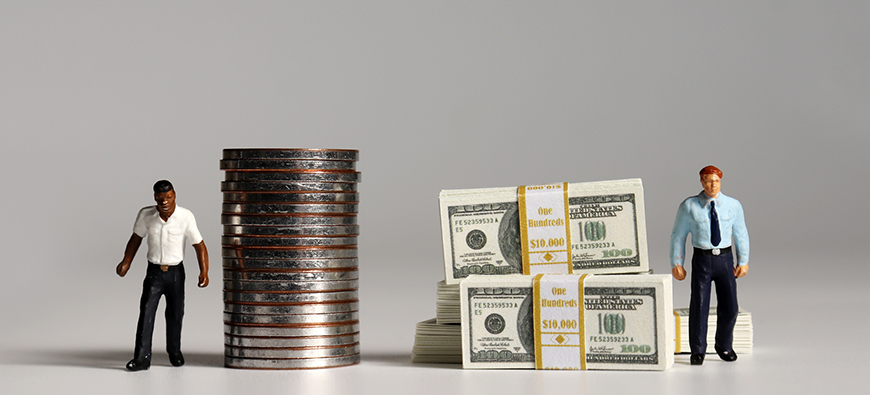
Addressing the Income Inequality Imperative Before It’s Too Late
Brought to you by Promontory Interfinancial Network

There’s an unofficial adage in journalism that three similar events make a story. One car wreck at a particular intersection is an accident. Two accidents are an unfortunate coincidence. Three times is a trend – and an issue to discuss and address.
So it was hard not to start worrying when three different guests – an entrepreneur, a former regulator and a longtime financial services consultant – mentioned the same potential fear on Promontory Network’s podcast “Banking with Interest.” They all worried that rising economic inequality, which has been exacerbated by the Covid-19 crisis, could spur widespread social unrest beyond anything we’ve seen to date.
“Things can go really bad,” entrepreneur and Shark Tank costar Mark Cuban told me in April, well before the brutal police killing of George Floyd in late May sparked nationwide protests in response to racial injustice and inequality. “We’ve seen riots. We’ve seen small businesses burn down.”
One recent warning came from Karen Shaw Petrou, managing partner of Federal Financial Analytics. Petrou is one of the most thoughtful voices in the financial services industry; since 2018, she has been adamant that income inequality is an increasing – and underappreciated – risk to the financial system.
“You have empirical and theoretical evidence that the more economically unequal a nation is, the more fragile its financial system,” Petrou told me in June. “I worry… that prolonged economic inequality, combined with the kinds of crises it keeps precipitating, will also lead to rage. History is not inspiring on the topic of what happens to societies with profound inequality.”
John Hope Bryant, the founder, chairman and CEO of Operation Hope, a not-for-profit dedicated to financial literacy and economic inclusion, agreed.
“Societies don’t crater from the top down,” he told me. “They crater from the bottom in. You cannot have 1% doing great, 15% doing pretty good and 80% plus doing pretty crappy and expect that to be sustainable.”
They are hardly alone. Both Citigroup CEO Michael Corbat and JPMorgan Chase & Co. Chairman and CEO Jamie Dimon flagged economic inequality as a growing threat to financial and political stability. And Brian Brooks, Acting Comptroller at the Office of the Comptroller of the Currency, acknowledged to me that systemic inequities need to be addressed.
“People are not actually crying out because the system is a terrible system, right? They’re crying out because the system that has worked for a bunch of people has totally excluded other people for a fairly long period of time,” he told me. “And the banking system can fix that.”
Among other things, Brooks wants to reexamine how credit scores are calculated and how current models shut minority Americans out of the finance system.
Economic inequality predates the spread of the coronavirus. The wealth gap between the richest and poorest families more than doubled from 1989 to 2016, according to the Pew Research Center. The data is particularly grim for African Americans. The average wealth of white households was seven times the average of black households in 2016, according to a recent post by Petrou. White Americans owned 85% of U.S. household wealth at the end of 2019, she wrote, while Black Americans held just 4.2%.
But the coronavirus crisis is set to make the problem far worse.
“Low-income households have experienced, by far, the sharpest drop in employment, while job losses of African-Americans, Hispanics, and women have been greater than that of other groups,” Federal Reserve Chairman Jerome Powell told lawmakers recently. “If not contained and reversed, the downturn could further widen gaps in economic well-being that the long expansion had made some progress in closing.”
There are proposed solutions. Petrou has called for the creation of an “Equality Bank,” controlled by a consortia of banking companies to “rewrite the profit equation to serve low- and moderate-income households.” This bank could offer short-term, low-dollar loans to consumers through the banking system, without the often-onerous rates and terms of existing products like payday loans.
Bryant has called for a new Marshall Plan to combat the problem, including calling for a universal income for workers making less than $60,000 per year, a national financial literacy mandate, and a redesigned education system that includes a free college education for most students.
“You need a mass of people to be highly educated,” Bryant said. “This is not rocket science. It’s the radical movement of common sense. As you educate more people, and raise credit scores along with it, you get more economic energy. You get more small business startups, you get more job creation. You get higher educational engagement. You get better skilled workers. You get less societal friction. This is an investment, not a giveaway.”
Brooks, meanwhile, has said the OCC is set to launch a pilot project designed to bring together banks, civil rights organizations and academics to tackle wealth creation. Cuban has talked about creating jobs to track and trace the spread of the virus in the short-term and pushed for government investments in low-income housing and companies offering stock to employees so that they have a stake in a firm’s success.
Tackling economic inequality hasn’t been a high priority for many in banking and government. That needs to change – and soon. While people may reasonably disagree on the right solution to this issue, most are of the same mind when it comes to what happens if we don’t try to address it.
We need to lift people “from the bottom-up,” Cuban told me. “We have never thought like that in the past, and we need to. Because if we don’t, oh my goodness … If we screw up, it could get ugly.”


